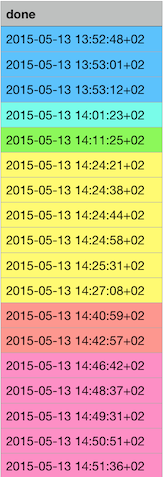Building up on Erwin's answer, here is the full query for tallying up the amount of time people spent on those sessions/islands:
My data only shows when people finished reviewing something, not when they started, which means we don't know when a session truly started; and some islands only have one timestamp in them (leading to a 0-duration estimate.) I'm accounting for both by calculating the average review time and adding it to the total duration of islands.
This is likely very idiosyncratic to my use case, but I learned a thing or two in the process, so maybe this will help someone down the line.
-- Returns estimated total study time and average time per review, both in seconds
SELECT (EXTRACT( EPOCH FROM logged) + countofislands * avgreviewtime) as totalstudytime, avgreviewtime -- add total logged time to estimate for first-review-in-island and 1-review islands
FROM
(
SELECT -- get the three key values that will let us calculate total time spent
sum(duration) as logged
, count(island) as countofislands
, EXTRACT( EPOCH FROM sum(duration) FILTER (WHERE duration != '00:00:00'::interval) )/( sum(reviews) FILTER (WHERE duration != '00:00:00'::interval) - count(reviews) FILTER (WHERE duration != '00:00:00'::interval)) as avgreviewtime
FROM
(
SELECT island, age( max(done), min(done) ) as duration, count(island) as reviews -- calculate the duration of islands
FROM
(
SELECT done, count(*) FILTER (WHERE step) OVER (ORDER BY done) AS island -- give a unique number to each island
FROM (
SELECT -- detect the beginning of islands
done,
(
lag(done) OVER (ORDER BY done) <= done - interval '2 min'
) AS step
FROM review
WHERE clicker_id = 71 AND "done" > '2015-05-13' AND "done" < '2015-05-13 15:00:00' -- keep the queries small and fast for now
) sub
ORDER BY done
) grouped
GROUP BY island
) sessions
) summary

